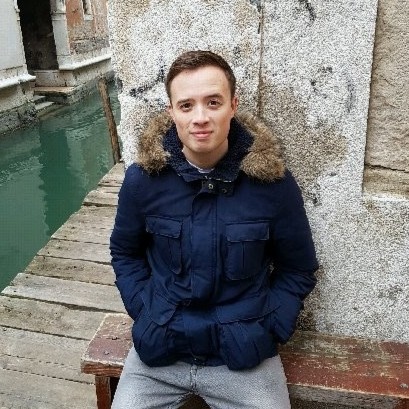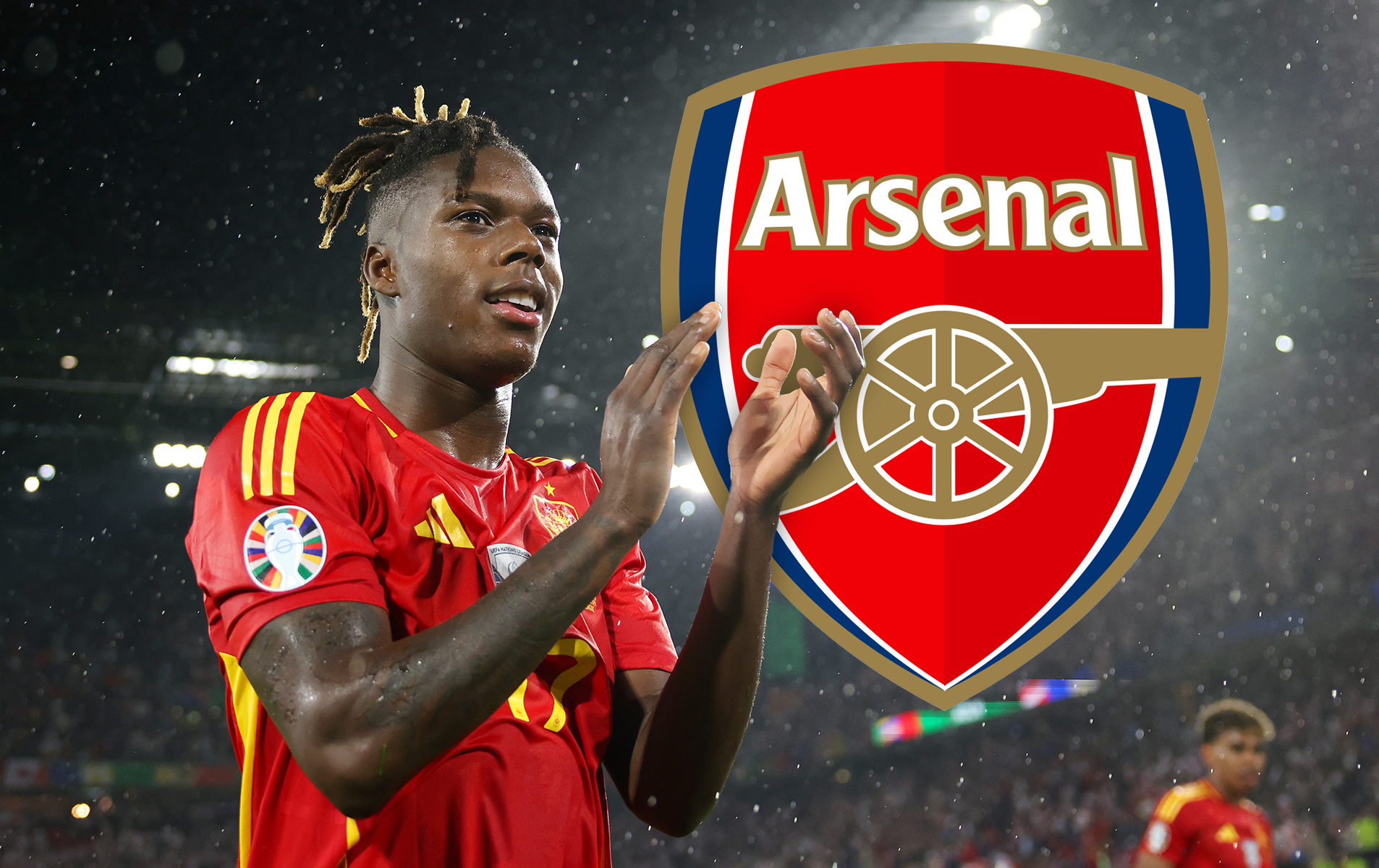Australia 31-0 American Samoa: The loneliest game in history
In 2001, Australia tore American Samoa to shreds in international football’s biggest ever beating. The result sent shockwaves through the game – but as FFT discovers from the protagonists 20 years on, not all was what it seemed
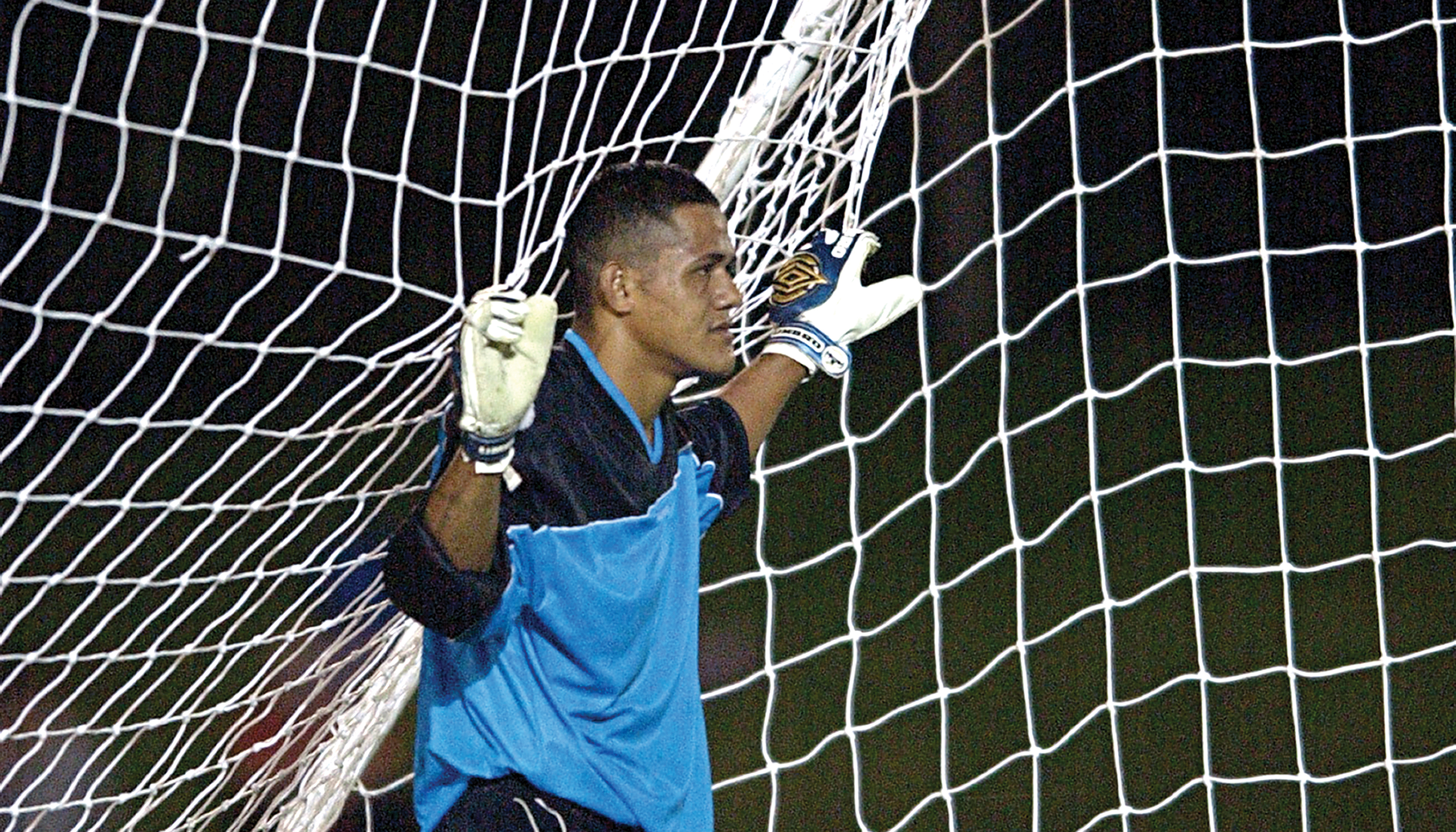
This feature first appeared in the May 2021 issue of FourFourTwo magazine. Subscribe now and get your five issues for just £5!
For more than 10 years, Nicky Salapu shouldered the biggest burden of his life in a world that didn’t truly understand. For 10 years, he woke up with the same sense of frustrated yearning that ate away at his thoughts. He’d never forget what it felt like to represent his country aged 20, and the sense of crushing humiliation that went with it. For 10 years, he wanted only one thing: to banish those demons of April 11, 2001 and win a football match with American Samoa. To finally make his people proud.
In 2011, Salapu got his wish when the world’s worst international team claimed their first ever victory in a FIFA-recognised match against Tonga, documented in the terrific Next Goal Wins film, which made a star of him and his heroic team-mates. Planet Football rejoiced with American Samoa while they went global, shedding their perennial losers tag once and for all.
There was one problem, though. Despite a critically acclaimed documentary and widespread fanfare, still just a fraction of admirers knew the real story behind the catastrophic scoreline that had assured them infamy and changed Salapu’s life forever: Australia 31-0 American Samoa. Twenty years on, Nicky knows he’ll never escape the ball and chain of international football’s heaviest defeat – but luckily for him, FourFourTwo is on hand to at least explain why that ludicrous night in Coffs Harbour comes with more asterisks than a French comic book...
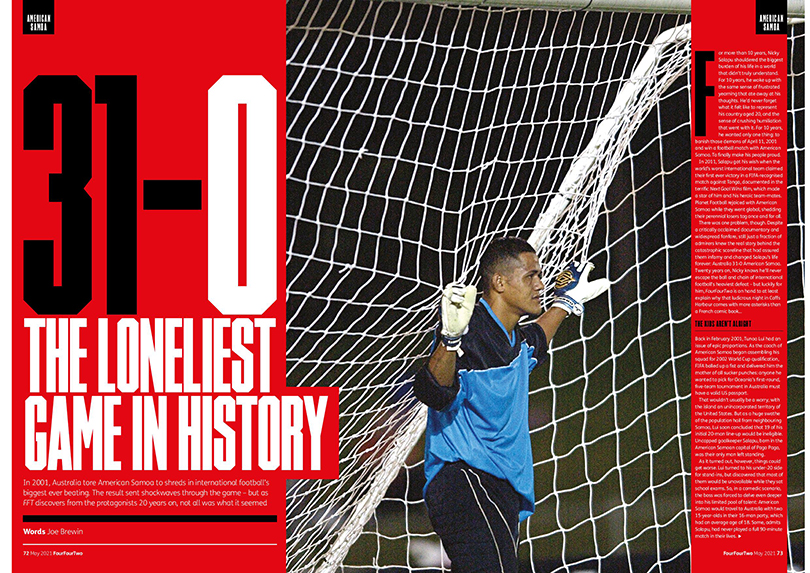
The kids aren't alright
Back in February 2001, Tunoa Lui had an issue of epic proportions. As the coach of American Samoa began assembling his squad for 2002 World Cup qualification, FIFA balled up a fist and delivered him the mother of all sucker punches: anyone he wanted to pick for Oceania’s first-round, five-team tournament in Australia must have a valid US passport.
That wouldn’t usually be a worry, with the island an unincorporated territory of the United States. But as a huge swathe of the population hail from neighbouring Samoa, Lui soon concluded that 19 of his initial 20-man line-up would be ineligible. Uncapped goalkeeper Salapu, born in the American Samoan capital of Pago Pago, was their only man left standing.
As it turned out, however, things could get worse. Lui turned to his under-20 side for stand-ins, but discovered that most of them would be unavailable while they sat school exams. So, in a comedic scenario, the boss was forced to delve even deeper into his limited pool of talent: American Samoa would travel to Australia with two 15-year-olds in their 16-man party, which had an average age of 18. Some, admits Salapu, had never played a full 90-minute match in their lives.
Get FourFourTwo Newsletter
The best features, fun and footballing quizzes, straight to your inbox every week.

“That’s true – they barely knew how to kick a soccer ball,” he sighs to FFT. “In the end, we were just trying to find anyone who had an American passport. If you had one, guess what? You were going to join our team.”
With that in mind, restricting the scoreline to 13-0 in their first qualifier against a handy Fiji side was a minor triumph. Two days later they suffered an 8-0 stuffing from local rivals Samoa, the island on which Salapu had spent nearly all his life.
“My grandma and aunt took me to Samoa when I was three months old, and I grew up there until I was 19,” he continues. “I played for my village team, then ended up featuring for Samoa’s U12s, U15s and U17s. American Samoa always counted as a win if we played them – they weren’t really a rival, because it was like bullying a little kid.”
In that hiding from their neighbours, Salapu was so exasperated that he raced upfield to take free-kicks. “I had to – I was the only one who could hit it 40 yards,” he laughs. “I got tired from the defeats, but also from running up and downfield.”
The misery didn’t relent. American Samoa lost another of their better players to injury, although perhaps it was to extreme nausea: Alex Savea had represented the U17s months earlier when they were obliterated 30-0 by Australia’s kids. “A repetition of that score is not beyond the realms of possibility,” noted the Sydney Morning Herald, ominously.
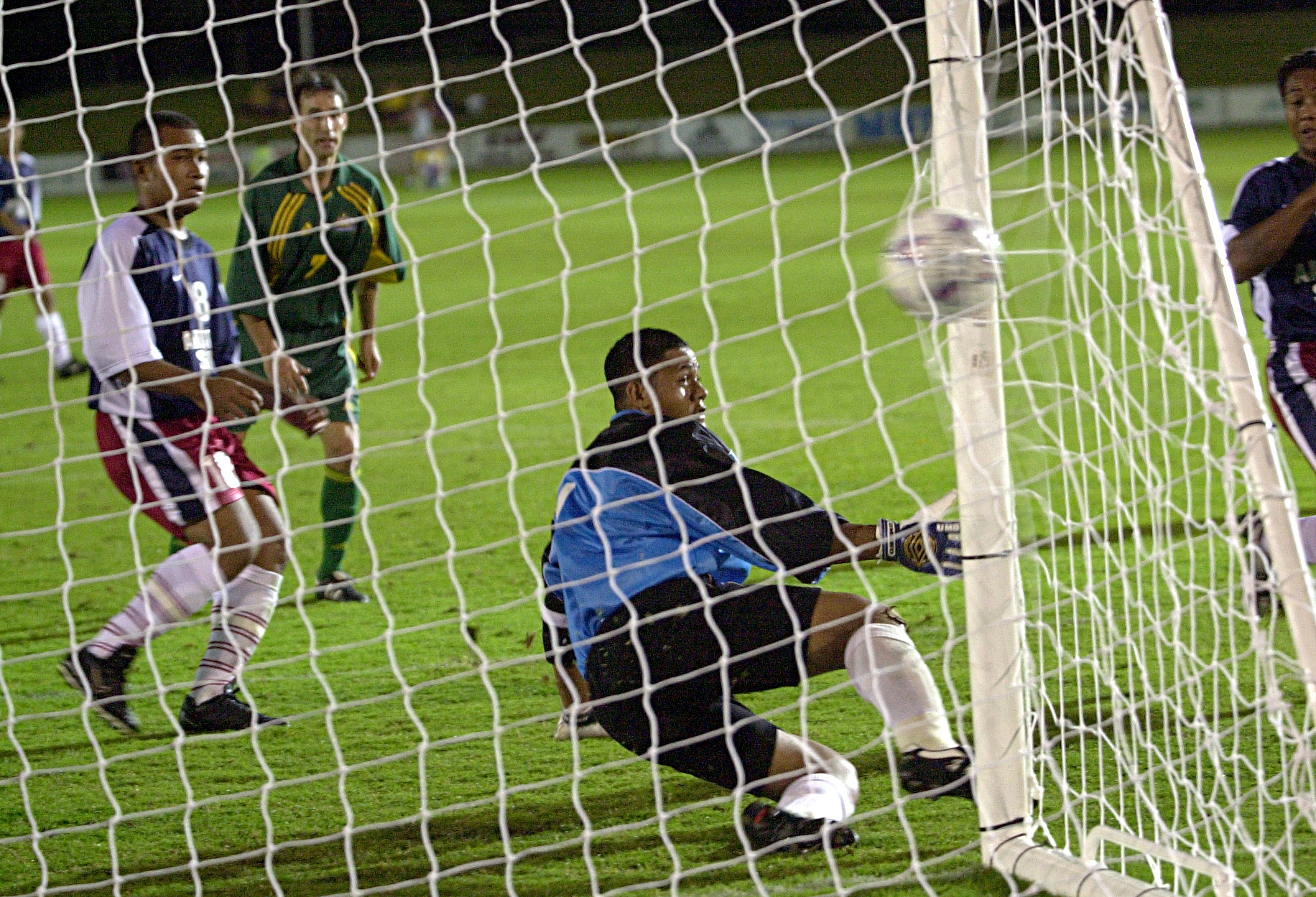
When matchday arrived, everybody knew what was coming: the Socceroos had already dished out a world-record 22-0 shellacking of Tonga – one which riled more than pleased head coach Frank Farina. “I don’t think we’ve got anything to gain out of games like this... no one wins, it’s a disgrace,” he huffed, as the OFC quickly decided that 2006’s qualification campaign would involve a first round solely for the confederation’s minnows.
But as Australia, ranked 75th in the world, prepared to devour the depleted underdogs, Salapu was braced. “I knew the kids weren’t that good, but I just tried to stay strong and believe in us,” he says. “It didn’t matter what the score was, we were still staying together. There was no ‘you’re good, you’re not’ – we were a team and representing our country. We always want to make them proud... but of course, that night it didn’t work out well.”
American Samoa’s best player could only watch the bloodbath unfold in front of him. It actually took Australia until the 10th minute to grab their opening goal via former Bolton midfielder Con Boutsianis, but Farina’s men showed no remorse thereafter. By half-time, it was 16-0; when the final whistle sounded, Australia had netted so frequently that the scoreboard read 32-0, before being corrected. Take off the first 10 minutes and factor in 30 seconds to restart after every strike, and the hosts had netted at a rate of one goal roughly every two minutes.
Unlucky number 13
While Salapu’s third outing for his nation had ended in ultimate shame – despite genuinely glowing reports for him in the following day’s newspapers – a 22-year-old forward with the same number of caps made football history on the other side. Archie Thompson struck 13 goals in the rout, with team-mate David Zdrilic notching eight. The previous record for most goals in a World Cup fixture had been seven – held by Socceroo Gary Cole and Iran’s Karim Bagheri – while only Bon Accord’s John Petrie had hit 13 in one match before, during 1885’s famous 36-0 demolition of Arbroath.
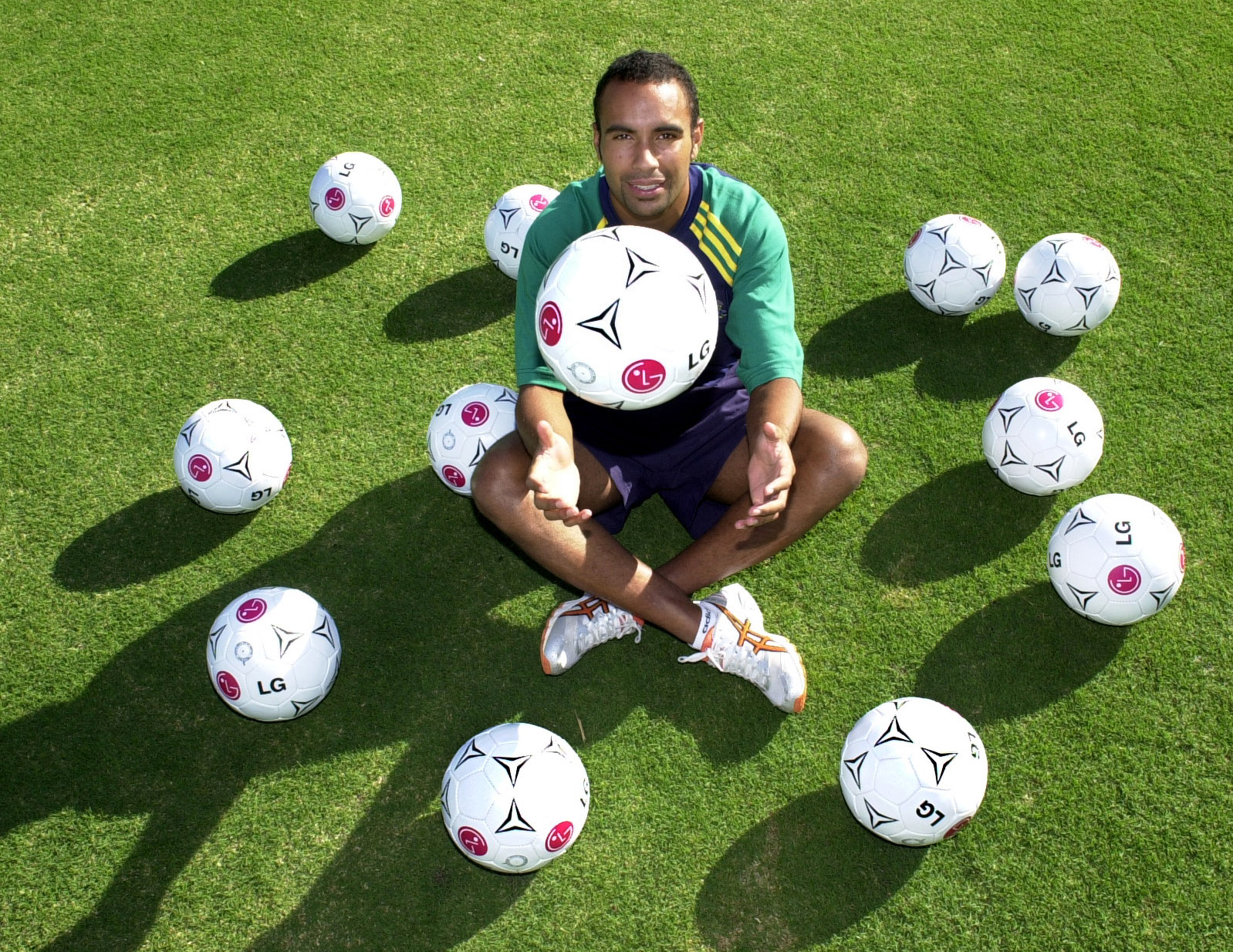
“I was trying to get into the national team around then, and these lead-up games were important for that,” Thompson, then of the Sydney-based Marconi Stallions, tells FFT. “It was tough, as Frank Farina had many of the same squad he’d used in previous qualifiers. It was a bit of a boys’ club. There were quality players in the top leagues, to be fair, so you’d always put your hand up and be desperate to play no matter who the opposition was.”
Was he aware, though, of just how bleak the circumstances were for American Samoa going into the game? “I actually heard about the passport thing a couple of months ago, honestly,” he claims. “I thought their squad seemed young, but bro: I’ve looked back on me scoring and can’t remember what I was feeling – it’s only when you see the footage now that you think, ‘OK, it was embarrassing’.
“I felt so sorry for those guys, because we couldn’t not try. It felt bad the way we were scoring and how easy it was, but we simply had to do what we had to do. I didn’t know the scoreline was going to be like it was, but whenever you represent your country you’ve got to go hard. There’s one photo I remember where I’ve got my hand on my head and we’re all having a laugh – but that’s basically what it was. That whole week was just nice to be in a cool area of Australia, with team-mates I only looked up to back then.”
With only one side progressing through the five-team group and Fiji presenting a genuine threat – as Australia’s more modest 2-0 win three days later attested – Farina defended the caning by insisting goal difference could eventually prove crucial. For Salapu, however, the Aussies’ approach has never sat right.
“I think it’s bulls**t,” he says. “If they didn’t know [about our situation], they only had to look at the Fiji game a week before we played them. We lost by 13 goals, and Australia then put 22 past Tonga. How could they not have known what the outcome was going to be? When you score 10 times in the opening 15 minutes, it makes no sense to say, ‘We didn’t even know’. Our team featured high school kids and even elementary students.
“What frustrated me the most was this: if you love football, you shouldn’t laugh at the other team when it’s 28, 29-0. If you see the pictures, that’s what they were doing. That’s not football, so that’s why I’m saying it’s BS.”
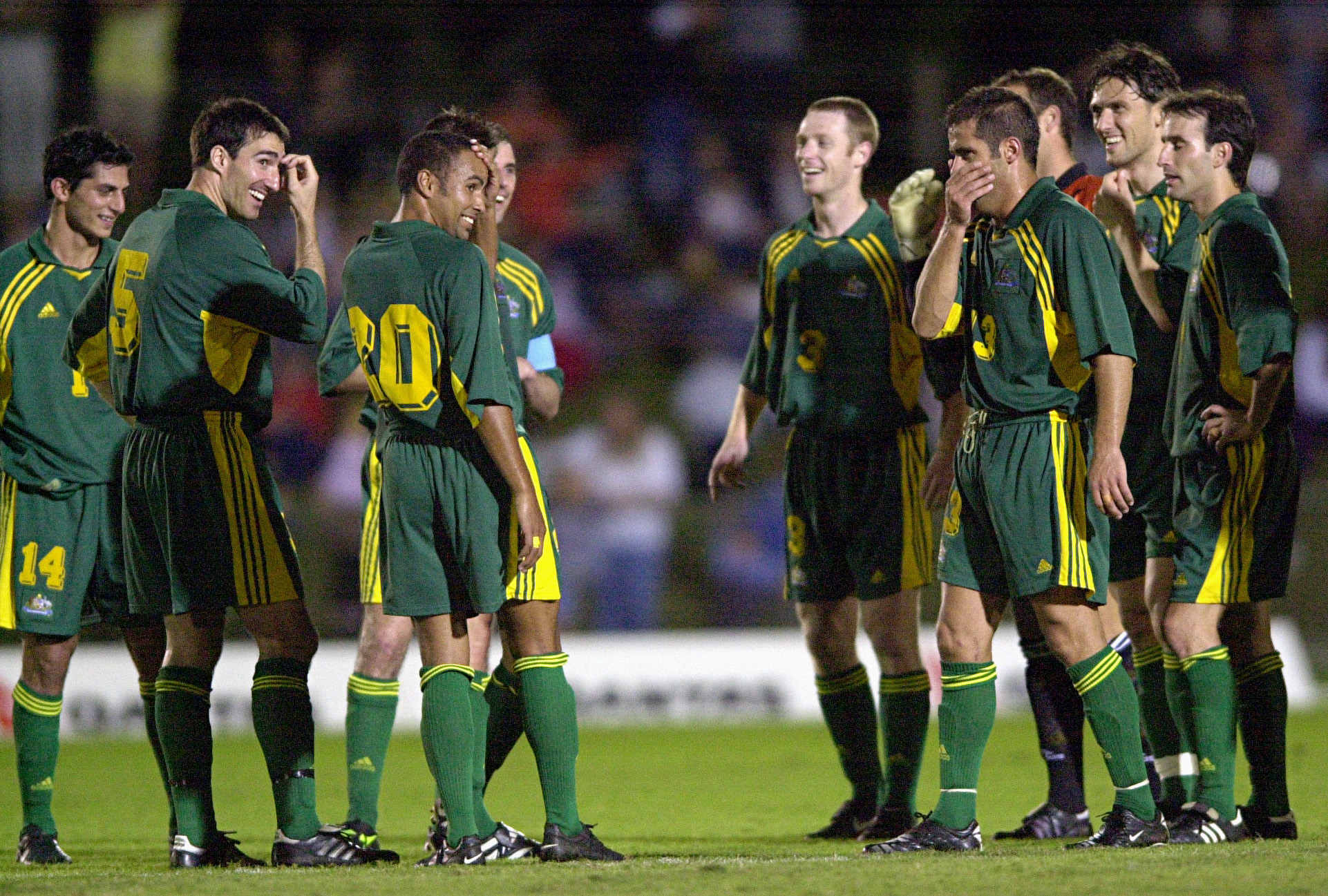
While the earth-shattering result ultimately had no bearing on OFC’s decision to change their World Cup qualification process, given they had already agreed to do so ahead of the game, Australia went one step further in 2006 by leaving the confederation completely to join Asia’s more competitive division. They still qualified automatically in 2010 and 2014, before slogging it through play-offs against Syria and Honduras in 2018.
Life went on for Salapu and Thompson, but in very different ways. For the record-breaking frontman, who in just three appearances had surpassed his own manager’s goal haul over a 10-year international career, expectations were immediately ramped up. After trials at Anderlecht and Sturm Graz, top-flight Belgian side Lierse signed him later that year. But his achievement hung heavy.
“It’s obviously a conversation starter now,” continues Thompson. “It went worldwide at the time, and I was looking to move overseas before that match anyway. When I arrived in Belgium, though, there was excitement that I’d score loads of goals every game. In a way it was brilliant to have the record, but the flip side was that expectations weren’t realistic. That was quite difficult, but when I look back on it now, who’s in the football record books? Mine might be in small print scoring 13 goals against American Samoa, but it’s still pretty special to say you have a world record.”
Ironically, after Salapu’s honourable efforts in keeping a barbarous scoreline down, the gloveman headed for Australia. “I had a deal with Palm Beach on the Gold Coast, but sadly the visa situation didn’t work out,” he recalls. “I tried out there for a month and went back to the island, then two weeks later they said they wanted me – I ended up staying for four or five months.”
With his visa expiring and few other options on the table, Salapu travelled over to Seattle in 2002. It was either the Rain City or joining the US military, just like so many of American Samoa's young population.
“The army is the dream for any family on the island,” he reveals. “Either you’re going to finish school and work at the tuna canneries, or you’re going to get shipped off to join the military. I thought about it as well, but soccer was way too much for me.
“After Australia in 2001, I thought I might quit soccer and go back to playing rugby. But after that match, I reset myself and thought, ‘If I give up on football, why have I wasted a decade of my life?’ I had to continue doing something I loved. I thought I could possibly find a club in the US, so I paid $50 to try out with the [Seattle] Sounders twice. But there were far too many players. They already have a team, so you have to know someone.”
He may be 40 now, but Salapu hasn’t given up on the game he loves. Far from it, in fact: because in 2021, he’s got one last chance to make his country proud.
Next goal: win (again)
Today, Nicky is a happy man: long settled in the States with his wife and son, and working as an engineer for a security company. For colleagues, the fascination of his star role in Next Goal Wins still hasn’t worn off – just as it hasn’t for the players he comes up against in the local Hispanic league. At weekends, he referees youth-team games to stay in shape, turning down the regular offers of paid work from uber-competitive soccer parents.
“I hate making money in football – I don’t have the mindset for that,” he explains. “Over here, there are clubs who say, ‘You can train this kid for $100 an hour’. I don’t want to do that: keep the money and buy your kid some equipment. Sadly, football in the States is all about money – I see it every time I referee and think, ‘If these kids are having to pay all this, they should be winning the World Cup’. The money goes to clubs, and then they pay some horrible coaches.”
For Salapu, love is the key – and this June, American Samoa’s greatest servant will be back to help his team begin 2022 World Cup qualifying. Having played as recently as 2019, he’s under no illusions of how hard it will be – their last results included a 13-0 loss to the Solomon Islands and an 8-1 trouncing from Tahiti. But what’s a life without dreams?
“It was so tough in 2019 [during the Pacific Games],” he says. “The chemistry and quality just wasn’t there. Compared to our World Cup qualifiers in 2015, our expectations were 25 per cent of that. I’m training hard right now, though – I still have the fitness and a small amount of quality. Just enough to make it through the World Cup! I want to make it to the second round before I hang up my boots.
“The problem is that once we’re done with the World Cup qualifiers, we’re done for four years. It’s annoying, irritating and frustrating. Look at Fiji and Papua New Guinea – that’s why they’re better from now until forever, as they carry on playing after the tournament.”
American Samoa are currently 192nd out of FIFA’s 210 nations, having won twice more since 2011’s seminal victory against Tonga – but their hurdles to improve are unchanged. With a population of around 50,000, the tiny country sat halfway between New Zealand and Hawaii continue to fight for attention in a region dominated by other sports.
“Just getting interest is the hard part, but the biggest challenge – or certainly one that’s most unique – is their link to the US,” says Ola Bjerkevoll, editor of footballoceania.com. “It makes it easier for people to leave the island and go to the mainland for studies or military service, and then often they don’t come back. Players might get called up for the national team, but American Samoa rarely play – and sometimes, you may not know if players even exist if they only compete in the US.
“The main issue is money – travel between Oceania nations is costly, and the OFC is the world’s poorest confederation. Players have normal 9-5 jobs and other things going on in their lives, and essentially play for fun. You have the bottom four teams in OFC qualifying – American Samoa, Samoa, the Cook Islands and Tonga – who are roughly the same level, skill-wise and also financially. The other eight or nine are miles ahead in that respect, and that’s a gap you won’t close fast.”
In the meantime, Nicky & Co will go again. It’s not just the football he’s looking forward to this year, either: 2021 is expected to bring a film adaptation of Next Goal Wins, written by renowned director Taika Waititi and Iain Morris, creator of The Inbetweeners.
“I’m best friends with the guy who’s playing me,” grins Salapu. “I haven’t seen it yet, but it’s weird. At work I always have guys coming up to me saying, ‘Oh my God!’ I don’t want to become a celebrity or make money off any of that stuff – I just love to play.”
There is one thing Salapu wants from this interview, though – well, two. “Please, ask any American Samoans in England to come and support our national team and help us reach that second round,” he says, before making his second request: “A few years ago, I met Tim Cahill and told him that I need a rematch against Australia. He says he wants to make it happen, too – maybe when we’re older and can do something for charity. I want him to know I’m ready.”
Nicky Salapu is always ready to represent American Samoa. You can never keep a good man down for long.
READ NEXT
EURO 2020 KITS New away shirts released by Adidas for Germany, Hungary, Belgium, Spain, Russia and Sweden
RICHARD JOLLY France have to be favourites for Euro 2020, despite what the bookies say
THREE LIONS SQUAD FourFourTwo writers pick who they'd take this summer
Joe was the Deputy Editor at FourFourTwo until 2022, having risen through the FFT academy and been on the brand since 2013 in various capacities.
By weekend and frustrating midweek night he is a Leicester City fan, and in 2020 co-wrote the autobiography of former Foxes winger Matt Piper – subsequently listed for both the Telegraph and William Hill Sports Book of the Year awards.
